By Jason Doyle Oden
Everyone in the room knew the state of Oklahoma faces a nearly $1 billion shortfall for the next state budget. What they didn’t know was what Governor Fallin was going to suggest to solve the budget crisis. It amounts to changing the state’s tax system.
Fallin set the stage by outlining the situation the Legislature faces in crafting the next budget.
“I’m reminded of five years ago, when I gave my first State of the State address. We faced a number of difficult circumstances then as we started climbing out of a national recession. We worked hard to forge a more prosperous state. Just two years ago, we had the fourth-fastest-growing economy in the nation. Our savings account, the Rainy Day Fund, had grown to $535 million – quite an improvement over the $2.03 that was left remaining in the fund when I took office in 2011.”
Revenues have taken a hit due to lower oil and gas prices.
“We’ve seen a 70 percent drop in oil prices in less than two years, which has a tremendous impact on our revenue. There is an excess supply of oil and natural gas in the marketplace, and instability in worldwide markets doesn’t help.”
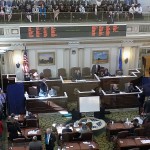 She is calling for a revamp of how the state approaches the budget in light of the current situation. Fallin’s executive budget calls for those changes to be made this session.
She is calling for a revamp of how the state approaches the budget in light of the current situation. Fallin’s executive budget calls for those changes to be made this session.
“It makes necessary cuts that will require continued efficiencies from agencies, prioritizes spending and lessens those reductions in our core service areas wherever possible. It modernizes our tax code to make it more consistent with 21st century commerce,” said Fallin.
“Because this budget proposes using recurring revenue, it uses zero one-time revenue. You heard me right: There is no one-time money in this budget.”
Also under Fallin’s proposed budget, most state agencies will see a reduction of six percent. Her figures indicate that if last year’s method of budgeting or a dip into the Rainy Day Fund were used it would result in 13.5 percent or ten percent across the board cuts, respectively. It would also drain the Rainy Day Fund.
The gist of the Governor’s plan is to capture $910 million of recurring revenues for appropriations to help fund core services going forward. The proposal also includes a $181.6 million tax hike on cigarettes. She wants to see more Oklahomans quit smoking to help improve health outcomes. She said that since taking office the smoking rate has dropped by 19 percent. Despite that drop, Oklahoma continues to rank low on health reports and surveys.
The plan to capture the other $729 million dollars comes in various ways. Fallin proposes to get $125 million dollars from non-appropriated agencies. Those agencies are usually self-funded because of the fees they collection. Some of the agencies give portions of their collections to the General Revenue Fund.
Other facets of the plan include $19.7 million by eliminating non-statutory, non-critical pass-through appropriations, $125 million through automatic reconciliation of some agency revolving funds, $40 million by reallocating apportionments from non-critical functions, and $200 million from modernizing the tax code. That last part could lead to taxing online streaming services like Netflix. The new sources of revenue would come from eliminating some sales tax exemptions.
Some agencies won’t go through the same cuts and some will actually see appropriations increase under Fallin’s plan. Instead of six percent cuts, the Department of Human Services, Health Department, Health Care Authority, Mental Health and Substance Abuse Services, Department of Public Safety, Oklahoma School of Science and Mathematics, and the Office of Juvenile Affairs will receive three percent cuts. The Department of Corrections will get $20 million supplemental appropriation this fiscal year and an increase of $10 million to its budget next fiscal year. DHS will get an additional $11.3 million to fully fund the Pinnacle Plan. Education would get a $178 million increase to fund permanent $3,000 teacher pay raise for every teacher.
Fallin also called for structural reform in Education. She wants K – 8 dependent school districts to be folded into the PreK – 12 system. She doesn’t want any of the schools to close, however. She also pushed her Oklahoma Works initiative and Education Savings Accounts.
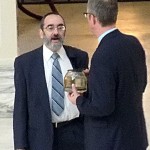 Oklahoma Policy Institute Executive Director David Blatt felt Fallin’s revenue enhancing measures should only be the beginning.
Oklahoma Policy Institute Executive Director David Blatt felt Fallin’s revenue enhancing measures should only be the beginning.
“Governor Fallin has rightfully recognized that Oklahoma has a revenue problem and that we must find new recurring revenues to make it through this budget crisis. Her proposals to modernize the sales tax and create savings with smarter criminal sentencing policies are a good starting point,” said Blatt.
Blatt wants to see a roll back of the income tax cut, repealing tax breaks, and other measures.
 OCPA Impact’s Chief Executive Officer Dave Bond is glad the Governor has found a different way to provide teacher pay raises without raising taxes.
OCPA Impact’s Chief Executive Officer Dave Bond is glad the Governor has found a different way to provide teacher pay raises without raising taxes.
“Thankfully Gov. Fallin continues to point out the danger the Boren tax increase poses to all Oklahomans if it reaches the ballot in November. The truth is, the Boren ballot petition would force Oklahomans to pay the highest sales tax burden in the nation, even though nearly half the money from the tax increase would never go to teachers.
“At the same time, many good teachers have left Oklahoma or left the teaching profession, and others are considering the same. This leaves parents of children in Oklahoma schools worried and apprehensive. We’re actively working with lawmakers at the Capitol to help reach a solution to provide $5,000 pay raises for Oklahoma teachers and hire 1,000 more teachers without increasing taxes on hardworking Oklahoma families.”
House Minority Leader Stan Inman calls the revenue changes a tax increase for the middle-class and lower-income families.
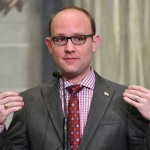 “For more than a year, the governor has maintained that Oklahoma doesn’t have a revenue problem,” Inman said. “And just last week, House Speaker Jeff Hickman told State Capitol journalists that Oklahoma doesn’t have a revenue problem, it has a structural budgeting problem.
“For more than a year, the governor has maintained that Oklahoma doesn’t have a revenue problem,” Inman said. “And just last week, House Speaker Jeff Hickman told State Capitol journalists that Oklahoma doesn’t have a revenue problem, it has a structural budgeting problem.
“Yet Monday, in her “State of the State” address, the governor called for $900 million in “new, recurring revenues for appropriations,” Inman noted. “That’s government-speak for tax hikes.
“Apparently the governor has finally discovered what we’ve known all along: we can’t cut our way to prosperity.”
Senate President Pro Tempore Brian Bingman is supportive of the Governor’s call for revenue reforms.
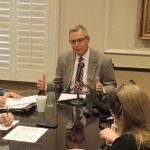 “It will take a combination of strategic cuts, apportionment and tax credit reform, and a reduction in our reliance on one-time funding sources to put us on stronger footing. We can, however, go further in our efforts to build a more solid fiscal foundation. I applaud the governor for her support of my proposal to streamline administrative functions in our K-8 school districts. Our small schools are some of our best schools, and this legislation can make them even stronger by maximizing resources and getting more dollars to the classroom without closing schools,” said Bingman.
“It will take a combination of strategic cuts, apportionment and tax credit reform, and a reduction in our reliance on one-time funding sources to put us on stronger footing. We can, however, go further in our efforts to build a more solid fiscal foundation. I applaud the governor for her support of my proposal to streamline administrative functions in our K-8 school districts. Our small schools are some of our best schools, and this legislation can make them even stronger by maximizing resources and getting more dollars to the classroom without closing schools,” said Bingman.
While supportive of a teacher pay increase, the Cooperative Council for Oklahoma School Administration and the Organization of Rural Oklahoma Schools voiced concern about her other education reforms in a statement issued after the State of the State Address.
“We do have grave concerns with Governor Fallin’s support for vouchers or “Education Savings Accounts” as well as her plan to rob communities of their ability to control local education matters. Governor Fallin’s proposal to consolidate rural K-8 or elementary school districts is misguided, impacts student achievement, and provides no real cost savings for Oklahoma schools.”
The teacher raises come as welcome news to the State Superintendent of Public Instruction.
 “We applaud Governor Fallin for recognizing the need to pay Oklahoma teachers competitively as soon as possible. The proposed $3,000 salary increase outlined in her State of the State address is an important step in aligning our educators’ pay with the regional average and could help alleviate the teacher shortages we are facing in all areas of pre K-12 education. We look forward to further discussion of the Governor’s plan,” said Superintendent Joy Hofmeister.
“We applaud Governor Fallin for recognizing the need to pay Oklahoma teachers competitively as soon as possible. The proposed $3,000 salary increase outlined in her State of the State address is an important step in aligning our educators’ pay with the regional average and could help alleviate the teacher shortages we are facing in all areas of pre K-12 education. We look forward to further discussion of the Governor’s plan,” said Superintendent Joy Hofmeister.
The Legislative session is underway. Most of the work will be done in the committee rooms funneling bills to the House and Senate floors.



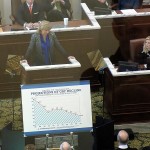
Does this include those e-cig thingies?
Where is Tax on Booze ? The interest of the Beer and Whiskey lobby is great in this state. E-Cig are all ready taxed ..local & state sales tax .
I still don’t understand why the state didn’t impose a well disposal fee, per barrel, on these company’s that are putting the old well water in the ground under pressure, granted the water is not useable for humans but they missed a “Fee” here.
As for the State of the State speech, I was very disappointed to see so many elected officials interacting with their cells phones during the speech. Really? The Governor of the State of Oklahoma is giving a 40 minute speech and you can’t get off your phone and pay attention?
Agreed. It is rude and disrespectful whether one is a fan of the governor or not.
Obesity causes poorer health outcomes and more economic drain than cigarettes and alcohol combined. Citizens could weigh in prior to checkout at the grocery store and pay a “sliding scale” tax based upon their individual levels of obesity. There could also be a requirement for deductions and dependents claimed on tax returns to be weighed between December 15 and December 31 (maybe at a tag agency?) and dependent tax deductions could be limited commensurate with the family’s obesity rate. This would ensure that cheaters (the ones who had normal weight people buy their groceries for them) would not get missed as a revenue stream.
Yes, it’s sarcasm. An illustration of ridiculousness. But, hey! Not to worry. We still have money to build museums.